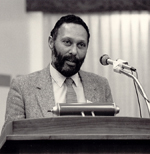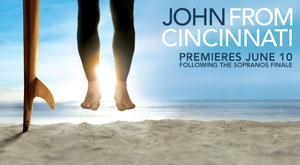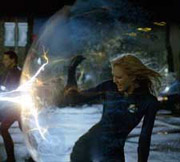
Writing these lectures this semester, I keep coming back to a couple of questions.
Should an undergraduate course present an ‘unbiased’ overview of a particular area of research? In other words, if you’re teaching an introductory media or cultural studies (or gender studies or political science or whatever) subject, should you present an overview of the highest profile thinkers in the field – even if they contradict each other?
Or should you present a subjective overview of the literature and thinking which you find most convincing, which presents a cohesive overview of a particular group or genealogy within the literature or which best represents the theoretical approach of your particular university?*
If only it was that simple, though. I’ve been also been wondering if an intro subject should present an overview of key thinking within a specific national context – Australian media studies, British media studies, American media studies…?
If you answer yes, then, of course you’re also left asking “well, shouldn’t I include some of the American (or Australian or British) stuff just as an example of how we don’t do things here?” Or perhaps you’re wondering if it mightn’t be kinda neat to include some work from Indian or Asian scholars…
On the CSAA list recently some of the contributors argued that we have a responsibility as scholars to raise our students’ awareness of the various ideological assumptions at work in John Howard’s intrusion into rural indigenous Australians’ affairs. On the one hand, I agree entirely, in part because it seems the ‘right thing to do’, but also because it seems the sort of thing that Stuart Hall would approve of. In other words, cultural studies has its roots in social activism (sort of), and issues of class and ethnicity and gender and sexuality have always been at its heart (well, for some people. Some cultural studies kids have decided that that stuff’s so last millenium). In this approach, then, you not only outline the various thinking at work in cultural studies, you present it as it if was ‘true’ or at least workable or something to aim for.
So, for example, when I outline concepts like ‘patriarchy’ (in a discussion of feminist textual analysis), I don’t present it as an abstract concept, but as a real context and ingredient in the texts we’re reading and in our lives.
Don’t get me wrong – I do agree with these concepts. I do firmly agree that patriarchy needs discussion (and dismantling?), that we should be getting very angry (or at least very active) about Howard’s policies, that we should be thinking critically.
It’s just that I wonder whether I should be teaching these things as if they were all ‘true’ (ie from a ‘biased’ perspective), or ‘objectively’, as if they are ideologies we should engage with and discuss, but not necessarily believe.
Part of me also worries if this is an entirely arbitrary and bullshit line of thinking. I wonder if it’s even possible to do a decent job teaching cultural studies (and gender studies and so on) if you don’t present them subjectively. I mean, that’s kind of what they’re about.
If I do attempt an ‘unbiased’ approach, am I not simply obscuring or ignoring my own personal beliefs about the world and politics and preconceptions? And if that’s the case, what the fuck am I doing calling myself a feminist, if I’m prepared to pretend that an objective approach is possible anyway? I spend three quarters of my time telling students that objective approaches aren’t possible – that we’re steeped in culture and that to really do ‘fair’ analyses we should begin by addressing (and stating) our own ideas about the world and how they affect how we read and write and think and talk about culture.
I wonder if this is part of the problem of tertiary education.
Teaching first years basic concepts like active readership, I say things like “Meaning isn’t an inherent and static quality of a text, but made through readers’ interaction with it” and “There is no single ideology or idea about the world, but multiple and competing ideologies” and adopting an approach in the classroom which explicitly emphasises the idea that ‘every reading (or opinion) is important and valuable’ so that students feel comfortable speaking up.
With this in mind, it seems logical to rework assessment to make it more achievable for students with ‘special needs’ (which is all of them – whether they have reading problems, aren’t comfortable with English, have to work two jobs to feed their families, care for elderly relatives or whatever), and to use a range of teaching tools and approaches in lectures and tutorials to meet the needs of such a vast range of learning styles and students’ needs.
But at the end of the day, the arbitrary marking system necessarily involves being unfair and making it very clear that not every reading style and every ideology and every mode of self expression is valuable or worthy. In fact, the entire marking system, the tutorial/lecture/assignment structure is constructed to encourage and valorise a particular approach to knowledge, a particular way of learning and teaching.
Teaching ‘inclusively’ (ie practicing what I’m preaching in a cultural studies subject) seems like holding back the tide. Fairly fruitless at best, self-deception at worst.
To this point I’ve been taking a mixed approach. I present particular ideas as if they were ‘true’: “patriarchy is…” rather than “some believe that patriarchy is…”, and, when the students ask, I clearly state my own ideas and beliefs. I don’t think it’s possible to canvas every ideology in just twelve weeks, so I present the ‘good ones’. I don’t think first years are really up to being presented with competing ideas (they’re still learning how to learn – getting over that ‘just memorise what I tell you’ thing and moving towards ‘what do you think about what I’ve told you? Do you agree? Why not? Why?’), so it’s best to present a more consistent approach. I also think we should be teaching Australian cultural studies – using Australian readings and ideas. With exceptions for obvious people (like Stuart Hall, who had such an impact in Australia)… but is that just cherry picking?
I wonder if perhaps we should think of the people teaching these subjects as resources in themselves. Not just a pair of legs for walking ideas past the students. We should regard their ideas and work as resources, and expect them to teach those ideas – to bring that** – when they’re in the classroom (whether they’re in front of 200 or 10 students). Which is really why I think that the very best and most experienced teachers should be teaching first years. …and why I think we should have the very best teachers teaching beginner dancers too, btw.
But in both dance and acadamia, teaching beginners or first years is seen as grunt work, the lowest status, least important teaching. Crowd control. The stuff we can farm out to pgrads for guest lectures or get in sessional staff to teach, rather than getting the most experienced, highest profile staff involved.
Which is a very great shame, because it’s a great opportunity to reach a very large number of students all at once, to fire their enthusiasm for the area, and to – if we’re thinking like those CSAA doods – actually encourage critical discussion of the culture we’re actually living in.
I also think it’s a shame that experienced staff take the least interest in these large introductory subjects. I know I’m only new to this, and probably don’t have a clue, and will change my mind as I get more experience, but aren’t these the most important students in the university? They’re harder to teach because they aren’t familiar with universities, and they don’t know any of the basic stuff that eventually brings them to more complex research of their own. But they are the people who have new ideas and fresh and unjaded. They don’t know what media studies is like. So if you come in swinging, using enthusiastic teachers who have mad teaching skills, really love what they do (and what they’re reasearching), surely that will spill over and infect the students (to mix a metaphor)?
And if the people teaching these subjects are also doing their own research, teaching first years will keep them in touch with the basic, fundamental work in their field. If the people doing this teaching are also the big names in publishing and research, won’t their enthusiasm for their work also be infective?
This semester, half the readings on the course are by people who taught me in my first year subjects at UQ – Tony Thwaites, Lloyd Davis, Graeme Turner, Frances Bonner, John Frow, etc etc etc. They’d teach subjects in their special areas, but they’d also be our tutors in first year, and they’d do one-off lectures in their speciality area. So we saw and heard and worked with these guys up close.

Now, when I’m teaching these first years, crapping on about how great Graybags is, I realise that these guys are just names to the students. They have no idea why Graybags is neat as a person as well as as a researcher. So they don’t really care.
I try to make these guys more than just names for the students – I always use photos of them in my slides, and I try to add in interesting details to keep their attention (I love the story of Roland Barthes for this sort of talk). If I’m talking about uber scholars like the Frankfurt School doods, I describe their social context as well, and how that might have influenced their work. I make sure I show a picture of Stuart Hall and tell them that he wasn’t born in Britain.
And I hope that helps them be interested in these people. But really, it would be far easier if Stuart Hall was standing in front of them telling them the story of how he got into talking about media.
This is an introductory subject, so half the job*** is selling media studies to them, making them want to learn more. So it has to be interesting. They have to care. They have to see how they could contribute to the area, how their ideas and experiences are important and worth talking about. And if that means pimping out cultural studies rock stars, so be it.
*Which is, of course, one of the reasons why it’s important to be researching while you’re teaching, and to have decent collegiality happening in your department.
**The Squeeze suggested the students might laugh less in my lectures if I lay off the ghetto talk. I reject the idea: I am totally street.
***The other half is skilling them up with some basic methodological and theoretical tools.
Textual analysis? √
Feminism? √
Cowboys? √









